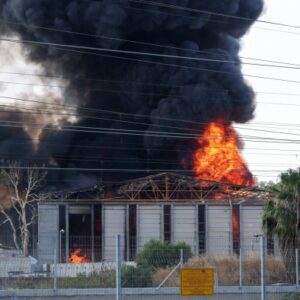ISLAMABAD:
The fate of 40 state-owned enterprises (SOEs) deemed strategic and essential by respective ministries but not accepted as such by Deputy Prime Minister Ishaq Dar remained undecided after Finance Minister Muhammad Aurangzeb chaired a cabinet committee meeting on Monday.
The Cabinet Committee on State-Owned Enterprises (CCoSOEs) refrained from confirming the classification of these 40 enterprises as strategic assets of Pakistan, thus ineligible for privatisation. The Ministry of Finance informed the committee that the concerned ministries hadn’t furnished details regarding the companies they deemed strategic and essential.
Last Friday, the Cabinet Committee on Privatisation (CCOP), led by Dar, directed the CCoSOEs to reassess the proposed categorisation of these 40 entities. Despite the Ministry of Finance’s stance, the relevant ministries had already communicated their list of assets deemed strategic and essential.
The committee, chaired by Aurangzeb, convened to address the CCOP’s directives but refrained from making a decision.
In a departure from past practice, the chairpersonship of the CCoSOEs and the CCOP now rests with different federal ministers. Dar leads the CCOP, while Aurangzeb heads the CCoSOEs. Last week, the Privatisation Commission board proposed listing 21 entities for active privatisation and categorising 40 others as strategic and essential, recommending their retention under government control.
However, Dar argued that many of these 40 entities didn’t meet the criteria for being deemed strategic.
Prime Minister Shehbaz Sharif has pledged to reduce the government’s footprint through aggressive privatisation. However, the Privatisation Ministry forwarded only 21 entities for active privatisation out of a total of 85 commercial entities. According to the SOEs Management Policy 2023, the CCoSOEs have the authority to declare any firm strategic based on ministry advice. However, the CCOP has the ultimate mandate to recommend entities for privatisation.
Read No strategic SOEs, minister pushes for privatization
The Ministry of Finance informed the CCoSOEs that the concerned ministries hadn’t provided the list of entities deemed strategic and essential. The CCSOEs were further notified that government ministries must decide by May 27th, per the SOEs policy. Based on finance ministry information, the CCoSOEs set a May 20th deadline for ministries to share information about their strategic assets.
It appeared that the finance ministry hadn’t provided complete information to the committee, as the proposed list of strategic entities had already been shared with another cabinet committee—the CCOP. An official from the finance ministry noted that a commercial entity can only be designated strategic or non-strategic based on board resolution.
The list compiled by the Privatisation Ministry, based on information from line ministries, revealed that the Cabinet Division identified two SOEs—the Pakistan Tourism and Development Corporation and the Printing Corporation of Pakistan—as strategic and essential assets.
The Commerce Division labelled five companies as strategic, including the Pakistan Reinsurance Company Limited, the National Insurance Company Limited, the State Life Insurance Corporation, the Trading Corporation of Pakistan, and the Pak Expo Centre.
Following the CCOP meeting, foreign minister and deputy prime minister stated that the insurance sector couldn’t be considered strategic. The Defence Production Division classified the Karachi Shipyard and Engineering Works as strategic and essential.
The finance ministry also designated five companies as strategic, including the SME Bank, the Exim Bank of Pakistan, the National Security Printing Company Private Limited, the National Bank of Pakistan, and the Industrial Development Bank Limited.
Similarly, the Housing and Works Ministry categorised the National Construction Limited and the Pakistan Environmental Planning and Architectural Consultant as strategic. The Ministry of Industry specified that the Export Processing Zones Authority and the Small and Medium Enterprises Development Authority are strategic firms.
The Ministry of Information identified the Pakistan Broadcasting Corporation and Pakistan Television as strategic and essential organisations.
The Ministry of Information Technology described the National Telecommunication Corporation as a strategic organisation.
The Maritime Affairs Ministry proposed four organisations as strategic—the Karachi Port Trust, the Port Qasim Authority, the Gwadar Port Authority, and the Pakistan National Shipping Corporation.
The food ministry labelled the Pakistan Agriculture Storage and Services Corporation (PASSCO) as strategic.
The Overseas Pakistanis Ministry declared the Overseas Employment Foundation a strategic entity.
The Petroleum Division categorised the Pakistan State Oil and the Pakistan Minerals Development Company as strategic.
The Power Division identified seven entities as strategic, including the Generation Holding Company, the National Transmission and Dispatch Company, the National Power Parks Management Company Limited, the Central Power Purchasing Agency Guarantee Limited, the National Engineering Services of Pakistan, and the Private Power Infrastructure Board.
According to a 2022 Ministry of Finance report, these entities collectively incurred Rs734 billion in losses. The CCoSOEs were informed that the 2022-23 report was in the final stages of preparation.
Published in The Express Tribune, May 14th, 2024.
Like Business on Facebook, follow @TribuneBiz on Twitter to stay informed and join in the conversation.
Related Posts

The markets are silent — that is worrying
Global Economy myFT Digest — delivered directly to your inbox.
Read more
Amazon boss says AI will mean fewer ‘corporate’ jobs
Artificial intelligence myFT Digest — delivered directly to your inbox.
Read more

